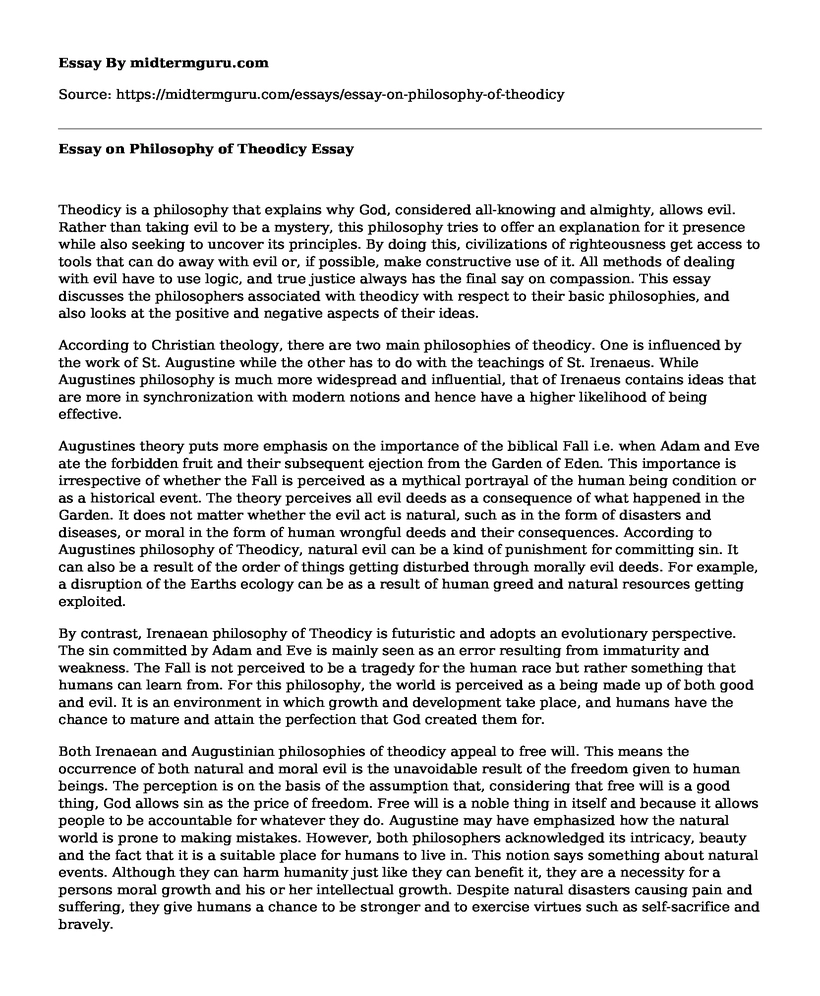Theodicy is a philosophy that explains why God, considered all-knowing and almighty, allows evil. Rather than taking evil to be a mystery, this philosophy tries to offer an explanation for it presence while also seeking to uncover its principles. By doing this, civilizations of righteousness get access to tools that can do away with evil or, if possible, make constructive use of it. All methods of dealing with evil have to use logic, and true justice always has the final say on compassion. This essay discusses the philosophers associated with theodicy with respect to their basic philosophies, and also looks at the positive and negative aspects of their ideas.
According to Christian theology, there are two main philosophies of theodicy. One is influenced by the work of St. Augustine while the other has to do with the teachings of St. Irenaeus. While Augustines philosophy is much more widespread and influential, that of Irenaeus contains ideas that are more in synchronization with modern notions and hence have a higher likelihood of being effective.
Augustines theory puts more emphasis on the importance of the biblical Fall i.e. when Adam and Eve ate the forbidden fruit and their subsequent ejection from the Garden of Eden. This importance is irrespective of whether the Fall is perceived as a mythical portrayal of the human being condition or as a historical event. The theory perceives all evil deeds as a consequence of what happened in the Garden. It does not matter whether the evil act is natural, such as in the form of disasters and diseases, or moral in the form of human wrongful deeds and their consequences. According to Augustines philosophy of Theodicy, natural evil can be a kind of punishment for committing sin. It can also be a result of the order of things getting disturbed through morally evil deeds. For example, a disruption of the Earths ecology can be as a result of human greed and natural resources getting exploited.
By contrast, Irenaean philosophy of Theodicy is futuristic and adopts an evolutionary perspective. The sin committed by Adam and Eve is mainly seen as an error resulting from immaturity and weakness. The Fall is not perceived to be a tragedy for the human race but rather something that humans can learn from. For this philosophy, the world is perceived as a being made up of both good and evil. It is an environment in which growth and development take place, and humans have the chance to mature and attain the perfection that God created them for.
Both Irenaean and Augustinian philosophies of theodicy appeal to free will. This means the occurrence of both natural and moral evil is the unavoidable result of the freedom given to human beings. The perception is on the basis of the assumption that, considering that free will is a good thing, God allows sin as the price of freedom. Free will is a noble thing in itself and because it allows people to be accountable for whatever they do. Augustine may have emphasized how the natural world is prone to making mistakes. However, both philosophers acknowledged its intricacy, beauty and the fact that it is a suitable place for humans to live in. This notion says something about natural events. Although they can harm humanity just like they can benefit it, they are a necessity for a persons moral growth and his or her intellectual growth. Despite natural disasters causing pain and suffering, they give humans a chance to be stronger and to exercise virtues such as self-sacrifice and bravely.
References
Dearey, M. (2014). Radical Freedom, Radical Evil? Kants Theory of Evil and the Failure of Theodicy. In Making Sense of Evil (pp. 56-77). Palgrave Macmillan UK.
Garcia, J. L. (2015). Theodicy. Ethics, Science, Technology, and Engineering: A Global Resource, 357-360.
Patrick, A. (2013). Is Theodicy an Evil? Response to The Evils of Theodicy by Terrence W. Tilley. Proceedings of the Catholic Theological Society of America, 50.
Cite this page
Essay on Philosophy of Theodicy. (2021, May 27). Retrieved from https://midtermguru.com/essays/essay-on-philosophy-of-theodicy
If you are the original author of this essay and no longer wish to have it published on the midtermguru.com website, please click below to request its removal:
- My Own Theory of Personality - Essay Sample
- Childhood Trauma - Paper Example
- Trauma Informed Parents: Analysis of the Website
- Research Analysis of Dan Browns View of Christianity - Paper Example
- Paper Example on OCD and OCPD Conditions
- Paper Example on Internet and Digital Technologies' Effects on Mental Health
- Literary Analysis Essay on "Civilization and Its Discontents" and "A Room of One's Own"







